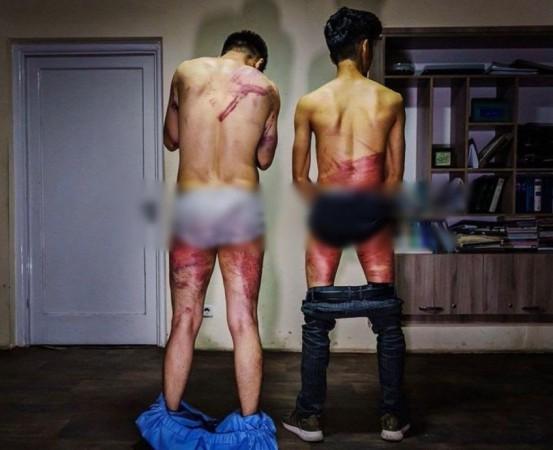"We could hear their screams and cries through the walls," the cellmates of the journalists tortured by the Taliban in Kabul said. The cellmates had even heard the sounds of women crying from pain.
Taliban fighters have been accused of beating and detaining journalists for covering protests in the Afghan capital Kabul, Al Jazeera reported.

Two reporters for the Etilaatroz newspaper, Taqi Daryabi and Nematullah Naqdi, were detained by the Taliban while covering a women's protest in the west of Kabul on Wednesday morning.
Two other journalists from the newspaper, Aber Shaygan and Lutfali Sultani, rushed to the police station along with the newspaper editor, Kadhim Karimi, to inquire about the whereabouts of their colleagues.
But the moment they reached the police station, they say, Taliban fighters pushed and slapped them and confiscated all their belongings, including mobile phones, Al Jazeera reported.
"Karimi barely finished his sentence, when one of the Taliban slapped him and told him to get lost," Shaygan told Al Jazeera, adding that as soon as they introduced themselves as journalists, the Taliban treated them with disdain.
The three men were taken into a small holding cell with 15 people in it, two of whom were reporters with Reuters and Turkey's Anadolu Agency, Shaygan said, the report added.
It was while they were in holding that the three heard reports of the disturbing abuse suffered by Daryabi, 22, and Naqdi, 28, who were being held in separate rooms.
"We could hear their screams and cries through the walls," the cellmates said of the piercing cries.
"The cellmates had even heard the sounds of women crying from pain."
Pictures showed clear physical evidence of the floggings and beatings with cables both men were subject to.
Daryabi's lower back, upper legs, and face were covered with deep red lesions, while Naqdi's left arm, upper back, upper legs, and face were also covered in red welts, the report said.
"They were beaten so bad, they couldn't walk. They were hit with guns, they were kicked, they were whipped with cables, they were slapped," Shaygan said.
He said the violence was so brutal that Naqdi and Daryabi had lost consciousness from the pain.
Though all five men were released after several hours in detention, Shaygan said they were issued a stern warning from a Taliban official before leaving: "What these protesters were doing is illegal and by covering such things, you all broke the law. We will let you go this time, but next time you won't be let out so easily."
Al Jazeera said those claims of illegality by the official struck Shaygan and his colleagues as going directly against statements the Taliban have made about freedom of the press in their "Islamic Emirate".
At an August 17 press conference, the group's spokesman Zabihullah Mujahid said: "Private media can continue to be free and independent; they can continue their activities... Impartiality of the media is very important. They can critique our work so that we can improve."
Mujahid made similar claims at a private gathering of journalists working for foreign media late last month. At the time, Mujahid encouraged journalists to be transparent and report the realities of life in a Taliban-run Afghanistan.
But in the ensuing weeks, Afghan social media has been full of videos and pictures showing the group's armed fighters trying to keep journalists from doing their job.
During that time, the Taliban has repeatedly been accused of abuses against journalists, the report said.
Shaygan and his colleagues were surprised to find that other journalists who had been detained that day were in possession of letters from Mujahid that granted them "the right to operate" at virtually any location as journalists.
This, he said, was further proof of the disconnect between the leadership and the foot soldiers of the Taliban.
"They don't want us to operate freely, they just want media to parrot their propaganda to the world."
Adding to his frustration and confusion is the fact that he and his colleagues were merely inquiring about the detention of their co-workers at the time of their detention and abuse.
"We just wanted to find out what happened to our friends."

















